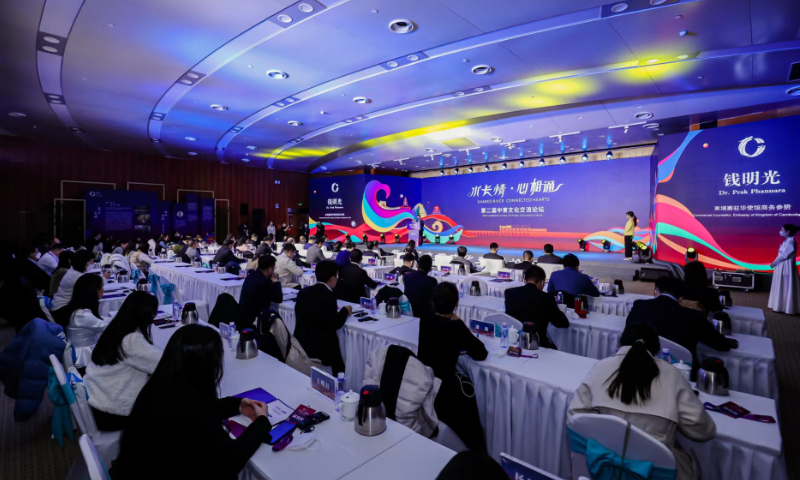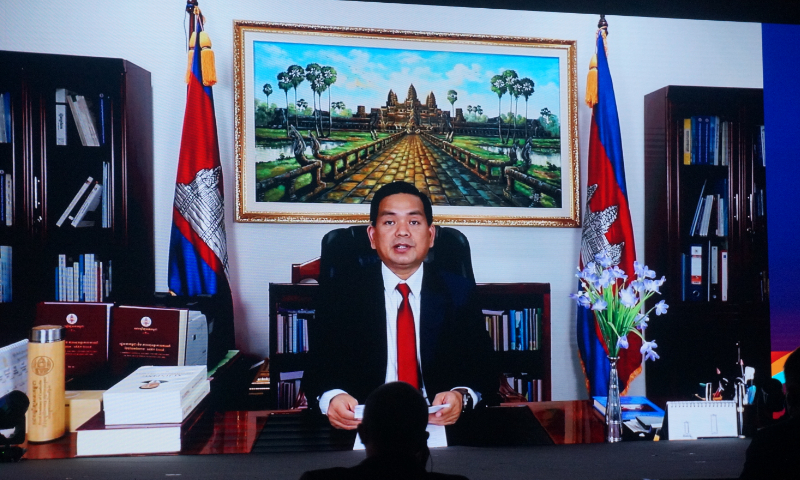
The second China-Cambodia cultural exchange forum is held in Beijing on February 13. Photo: Photo: Courtesy of Huaneng Group
The second China-Cambodia cultural exchange forum was held in Beijing on Monday, fulfilling the joint vow of carrying forward the "ironclad friendship" and building high-quality, high-level and high-standard ties between the two countries, following Cambodian Prime Minister Hun Sen's visit to China.
China and Cambodia released a joint statement on Saturday, the last day of the visit, in which the two countries vowed to build a China-Cambodia community with a shared future in the new era, and to carry forward the most treasured ironclad friendship over coming generations.
Both sides agreed to develop a "Diamond Hexagon" cooperation framework highlighting six priority areas: namely political cooperation, production capacity, agriculture, energy, security and humanity.
Officials from both sides, leading companies in both countries, and influential scholars and representatives attending the forum spoke highly of the China-Cambodia ironclad friendship, which has been bolstered by the political mutual trust between the leaders of the two countries, but also the heightened people-to-people exchanges in the last 65 years since the establishment of diplomatic ties.
The mainstay of such people-to-people contact is the Cultural Exchange Network of Cambodia and China, jointly established in 2021 by China's leading power producer China Huaneng Group and several influential academic institutions, think tanks, and companies in China and Cambodia.
The network has now extended to over 30 members, becoming a broader web for China-Cambodia civilization mutual learning and promoting the "Diamond Hexagon" cooperation architecture.
Relying on the network, representatives at the forum advised taking the Year of China-Cambodia Friendship as an opportunity to expand cooperation at sub-national levels, strengthen youth exchanges, and revitalize post-pandemic economies amid rapid recovery in the world's second-largest economy.
With the debut of the mini-documentary "I Repair Cultural Relics in Angkor" at the forum, people's memories were once again awakened by how China's cultural relic protection going global has vividly embodied the intersection of the ancient civilizations of China and Cambodia.
Located in northwest Cambodia, the Angkor Archaeological Park, inscribed on UNESCO's World Heritage Sites list in 1992, is the most popular tourist destination in the Southeast Asian nation. Covering an area of 401 square kilometers, Angkor contains the magnificent remains of the different capitals of the Khmer Empire from the ninth to the 15th century, and it consists of scores of key temples such as Angkor Wat, Angkor Thom, Bayon, Chau Say Tevoda and Ta Keo, among others.
China has sent expert teams to help restore ruined temples there since 1997, working on the Chau Say Tevoda temple and the Ta Keo temple successfully. The experts were hailed as Chinese defenders guarding precious Asian cultural heritage.
In the joint statement on building a China-Cambodia community with a shared future in the new era released on February 11, both sides agreed to promote the China-aid Project of Royal Palace Restoration in Angkor and protection and restoration of Preah Vihear Temple and other cultural heritage sites. The two sides are committed to joint action to preserve Asian cultural heritage, and are exploring the establishment of a China-Cambodia joint working group on cultural heritage, to promote across-the-spectrum cooperation.
At the forum, young students from China and Cambodia were also honored for spreading friendship between the two countries through short videos, demonstrating the practice of building a community with a shared future by the next generation of the two countries.
In the field of education, Huaneng Group has sponsored a Chinese culture study campaign at the Royal University of Phnom Penh in Cambodia, funding five local teachers and five students in exploring China's classical culture.

Photo: Hu Yuwei/GT
In his address, Cambodian Ambassador to China Khek Cai Mealy Sysoda pointed out the traditional friendship between the two countries dates back to ancient times and will go up to a higher level, with reinforced co-efforts in economy, trade and culture.
Investment and flagship projects China promotes in Cambodia have transferred advanced experience in hydropower construction and helped cultivate talent for Cambodia and other Lancang-Mekong countries.
One example is the Lower Sesan 2 Hydro Power dam, which was built and managed by China Huaneng Group. The dam is Cambodia's largest hydropower station and accounts for about one-fifth of the country's annual power generation, meeting the electricity needs of about 2.6 million people every year.
Wang Hailong, who is in charge of public relations for the project, told the Global Times on Thursday that since the station was put into operation in 2008, China Huaneng has trained more than 200 local technicians and managers. The company also created more than 2,000 jobs for local people at the peak of construction.
The project led to the relocation of 840 households and 3,690 poor people in the surrounding area, helping them move to villages with better living conditions, he said.
The project is a model in energy cooperation between countries, providing stable clean energy for Cambodia's national grid and reversing the country's heavy dependence on imported electricity. The enterprise also set up free electricity industry training centers and has offered scholarships to relocated migrants.
Deng Jianlin, the general manager of Huaneng Group, vowed at the forum to further implement the provisions in the China-Cambodia joint statement for strengthening hydropower, photovoltaic and other clean energy cooperation, and exploring green, stable and reliable energy.
Stung Treng Governor Svay Sam Eang praised the social responsibility endeavors of Chinese enterprises in the region.
A white paper on China's corporate image in Cambodia, compiled by the Royal Academy of Cambodia, Cambodia's top scientific research institution, assisted by Beijing Foreign Studies Universities, was launched at the forum. The paper shows the activities of Chinese enterprises in Cambodia, from innovative practices to open-minded sharing.
The white paper underlines a positive image of Chinese enterprises in Cambodia, featuring honest management, innovation, openness, and responsibility, along with concrete actions to build a community with a shared future.





